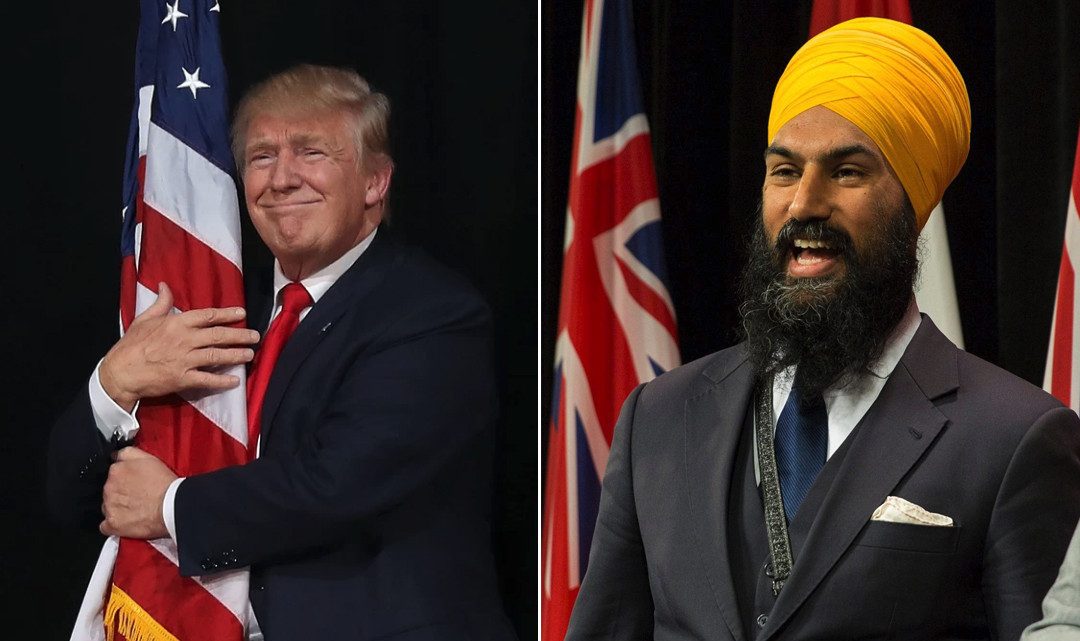
These Canadians Don’t Want to Party With Americans Because of Trump
July 4, 2018Presently, Canada and the United States are in the midst of a wrestling match.
Late last week, in Vancouver, following a dispiriting news cycle, the manager of an upscale Teahouse restaurant was fired after refusing to serve a customer wearing a “Make America Great Again” hat. Just a day later, hundreds of people swarmed US consulates across Canada, joining 600 US cities in voicing their opposition to the administration’s deplorable “zero tolerance” immigration policies. And tonight, a handful of politicians, including federal New Democrat leader Jagmeet Singh, have declined to attend the annual Fourth of July party at the US ambassador’s residence in the nation’s capital amid the growing trade war between the two nations.
Increasingly, some Canadians seem to be abandoning politesse—which is arguably the hallmark of our country’s limited foreign appeal—to protest the US government’s unjust and erratic actions. But does it really matter?
“Canadians, we’re polite and reasonable, but we will not be pushed around,” Prime Minister Justin Trudeau said earlier this month, following the G7 summit where Trump announced plans to place large import taxes on Canadian metals. Trump’s unilateral tariffs, of course, were in bad faith, and put hundreds of thousands of Canadian jobs at stake. Trudeau responded with retaliatory measures on many American products and Canada’s parliament unanimously supported him.
This disagreement falls into a string of others, all illustrating just how unsavoury the relationship between Canada and the US has become. The tension between the neighbours is now so great that it’s spilling out of private, geopolitical summits and into public spaces—parties, streets, restaurants.
“I stand by my decision to ask the patron to remove his hat,” Darin Hodge, the former Teahouse restaurant manager, told the Vancouver Sun. “The MAGA hat has come to symbolize racism, bigotry, Islamophobia, misogyny, white supremacy, homophobia. As a person with a strong moral backbone, I had to take a stand against this guest’s choice of headwear while in my former place of work.”
Naturally, as these political skirmishes have edged across the southern border and into Canada, Trump’s supporters have renewed efforts on claiming subjection to injustice and oppression. After three US administration officials were confronted at various restaurants in the past few weeks, critics began wildly invoking the legacy of Martin Luther King, Jr., as a way of shaming restaurants for their lack of “civility” in refusing to serve them.
It has even been speculated that removing Trump affiliates and supporters from restaurants, as in Vancouver, or protesting their presence in general, as in Ottawa, is a violation of their civil rights. This exclusion on partisan grounds has been compared, terribly, to the discrimination against blacks at lunch counters, or the refusal to bake cakes for gay weddings, or any other number of prejudicial infractions companies lodge against minorities.
But the problem with this comparison is history. Under the Civil Rights Act of 1964, there are protected classes of people restaurants don’t have the power to discriminate against: race, colour, religion, national origin. It is not illegal to refuse service, or to protest, on the basis of political beliefs.
Most importantly, in a time where the United States is separating families at the border, putting children in cages and lashing out at key allies, this rallying cry of unfairness and injustice seems like a concerted effort to obscure the dark realities of their actions.
Tonight, the US ambassador’s residence will host its annual Independence Day party. Under Obama and his appointee, Bruce Heyman, more than 4,000 people typically attended. Under Trump and Kelly Craft, the guest list has been pared down to just 1,000. Craft, who helped organize the bash, told her brother she’s worried the party will be a “flop.”
Whatever the turnout, the numbers are not likely to bother Trump, who will probably still claim it was the biggest party ever attended.
Follow Connor on Twitter.
This article originally appeared on VICE CA.


